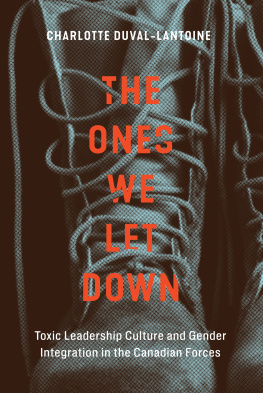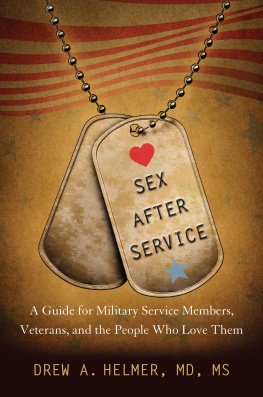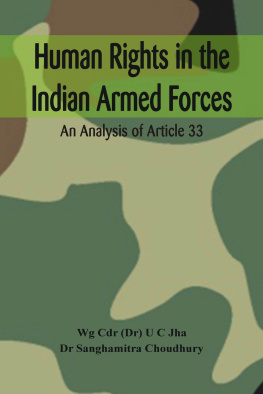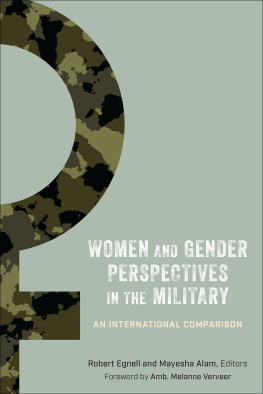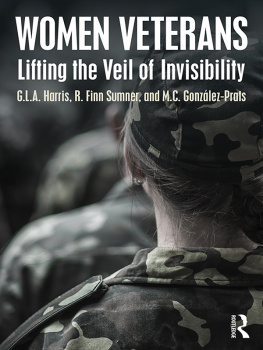Contents
Page List
Guide

THE ONES WE LET DOWN
HUMAN DIMENSIONS IN FOREIGN POLICY, MILITARY STUDIES, AND SECURITY STUDIES
Series editors: Stphanie A.H. Blanger, Pierre Jolicoeur, and Stfanie von Hlatky
Books in this series illuminate thorny issues in national and international security, analyzing both military and foreign policy. They highlight the human dimensions of war, such as the health and well-being of military members, the factors that influence military cooperation and operational effectiveness, civil-military relations and decisions regarding the use of force, and the challenges of violence and terrorism, as well as human security and conflict resolution. Some authors focus on the ethical, moral, and legal ramifications of ongoing conflicts and wars, while others, through the lens of policy analysis, explore the impact of military and political strife on human rights and the role the public plays in shaping international policy.
Published in collaboration with Queens University and the Royal Military College of Canada, with the Centre for International and Defence Policy, the Canadian Institute for Military and Veteran Health Research, and the Centre for Security, Armed Forces, and Society, the series plays a pivotal role in reconceptualizing contemporary security challenges both in the academic realm and for broader publics.
Going to War?
Trends in Military Interventions
Edited by Stfanie von Hlatky and H. Christian Breede
Bombs, Bullets, and Politicians
Frances Response to Terrorism
Christophe Chowanietz
War Memories
Commemoration, Recollections, and Writings on War
Edited by Stphanie A.H. Blanger and Rene Dickason
Disarmament under International Law
John Kierulf
Contract Workers, Risk, and the War in Iraq
Sierra Leonean Labor Migrants at US Military Bases
Kevin J.A. Thomas
Violence and Militants
From Ottoman Rebellions to Jihadist Organizations
Baris Cayli
Frontline Justice
The Evolution and Reform of Summary Trials in the Canadian Armed Forces
Pascal Lvesque
Countering Violent Extremism and Terrorism
Assessing Domestic and International Strategies
Edited by Stfanie von Hlatky
Transhumanizing War
Performance Enhancement and the Implications for Policy,
Society, and the Soldier
Edited by H. Christian Breede,
Stphanie A.H. Blanger, and Stfanie von Hlatky
Coping with Geopolitical Decline
The United States in European Perspective
Edited by Frdric Mrand
Rivals in Arms
The Rise of UK-France Defence
Relations in the Twenty-First Century
Alice Pannier
Outsourcing Control
The Politics of International Migration Cooperation
Katherine H. Tennis
Why We Fight
New Approaches to the Human Dimensions of Warfare
Edited by Robert C. Engen, H. Christian Breede, and Allan English
Canada as Statebuilder?
Development and Reconstruction Efforts in Afghanistan
Laura Grant and Benjamin Zyla
Women, Peace, and Security
Feminist Perspectives on International Security
Edited by Caroline Leprince and Cassandra Steer
The Ones We Let Down
Toxic Leadership Culture and Gender Integration in the Canadian Forces
Charlotte Duval-Lantoine
THE ONES WE LET DOWN
Toxic Leadership Culture and Gender Integration in the Canadian Forces
CHARLOTTE DUVAL-LANTOINE
McGill-Queens University Press
Montreal & Kingston London Chicago
McGill-Queens University Press 2022
ISBN 978-0-2280-1125-5 (cloth)
ISBN 978-0-2280-1126-2 (paper)
ISBN 978-0-2280-1271-9 (ePDF)
ISBN 978-0-2280-1272-6 (ePUB)
Legal deposit second quarter 2022
Bibliothque nationale du Qubec
Printed in Canada on acid-free paper that is 100% ancient forest free (100% post-consumer recycled), processed chlorine free
We acknowledge the support of the Canada Council for the Arts.
Nous remercions le Conseil des arts du Canada de son soutien.
Library and Archives Canada Cataloguing in Publication
Title: The ones we let down : toxic leadership culture and gender integration in the Canadian Forces / Charlotte Duval-Lantoine.
Names: Duval-Lantoine, Charlotte, author.
Series: Human dimensions in foreign policy, military studies, and security studies ; 16.
Description: Series statement: Human dimensions in foreign policy, military studies, and security studies ; 16 | Includes bibliographical references and index.
Identifiers: Canadiana (print) 20210387742 | Canadiana (ebook) 20210387963 | ISBN 9780228011262 (paper) | ISBN 9780228011255 (cloth) | ISBN 9780228012719 (ePDF) | ISBN 9780228012726 (EPUB)
Subjects: LCSH: Canada. Canadian Armed ForcesWomenHistory20th century. | LCSH: Women and the militaryCanadaHistory20th century. | LCSH: Sexual harassment in the militaryCanadaHistory20th century.
Classification: LCC UB419.C2 D88 2022 | DDC 355.00820971dc23
This book was typeset by True to Type in 10.5/13 Sabon
To all of those that came along the way
Contents
Acknowledgments
It takes a village. Aphorisms tend to be banal, for they reveal some simple, self-evident truths. Yet, their simplicity can be useful. It takes a village truly represents how this book came to be. It all started with Dr Allan English, who motivated me and steered me in the direction of this research project. He is also the person who offered me constant support and introduced me to the people who would become dear friends and integral parts of my writing adventure. It is thanks to Dr English that I developed a dear friendship with Dr Robert Engen, who generously provided the funding to publish this book, Dr Claire Cookson-Hills, and their daughter Posy; Dr-to-be Pete Rayls, Susan Rayls, and Emily; and Dr Robert Martyn. They have brought me joy, encouragement, and friendships that I cherish every day. They fed my curiosity, my will to learn, and my longing for a community. Thanks to this group I met Rosemary Park and Dr Karen Davis, without whom I would not have gained access to some of the most critical documents on gender integration.
Part of this village is Stone Yun, Jin Lee, Saahil Hamayun, Sydney Sebro, and my cousin Alice Leclercq. They have been there for me at the most difficult times of my life, and having them creating the space to vent and reminding me when I would get stuck in my head has been invaluable. Brandon Hillier and Kevin Shen, who have read my manuscript just to help me ensure my work was accessible to most, deserve special mention as well.
I would be remiss if I did not thank Dr Stefanie von Hlatky and Caroline Leprince. From our days at Women in International Security (WIIS) Canada onward, you have been both mentors and sources of inspiration. Caroline, I am thankful that what was a (semi)-professional relationship became such a wonderful friendship. Stefanie, I am beyond grateful for the continued opportunities.

